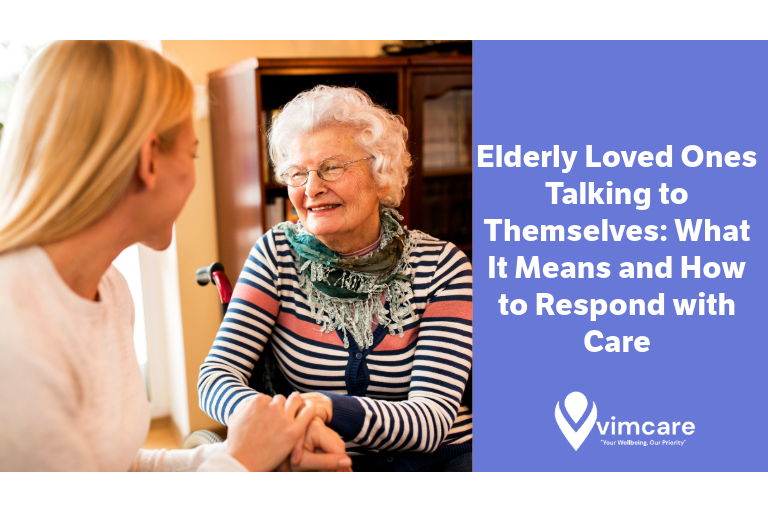It’s not uncommon to notice elderly loved ones talking to themselves. While this behaviour might seem unusual at first, it’s often harmless and can even serve as a healthy coping mechanism. Understanding the reasons behind this can help you support your loved one with empathy and care.
At Vim Care Limited, we believe in empowering families with knowledge to provide thoughtful, informed support for their elderly relatives. Let’s explore why self-talk might occur in older adults and how you can approach the situation with understanding.
Why Do Elderly People Talk to Themselves?
There’s no single explanation for self-talk, as it can vary greatly depending on the individual. Here are some common reasons why older adults may engage in this behaviour:
- Processing Thoughts and Emotions
Self-talk often acts as a way to organise thoughts or express feelings. For some seniors, verbalising their thoughts aloud can help them make sense of their emotions, particularly during challenging times. - Companionship and Comfort
Loneliness can be a significant concern for elderly individuals. Talking to themselves may provide a sense of company, especially for those who live alone or spend long periods without social interaction. - Memory Support
As memory and cognitive function change with age, speaking aloud can serve as a memory aid. For example, they might verbalise tasks or reminders to themselves, helping them stay on top of their daily routine. - Expression of Creativity or Reflection
Seniors may use self-talk to reflect on life experiences, revisit cherished memories, or express their creativity through storytelling or imagined conversations. - Mental Health or Cognitive Changes
In some cases, self-talk could be linked to mental health conditions, such as anxiety or depression, or cognitive issues like dementia. It’s essential to monitor the context and frequency of the behaviour to determine if further support is needed.
How to Respond with Sensitivity
If you notice an elderly loved one talking to themselves, your response can make a significant difference in how they feel about their behaviour. Here’s how to approach the situation with care:
1. Observe Without Judgement
Before jumping to conclusions, take time to observe the context. Is the self-talk occasional or frequent? Does it occur during specific activities, such as tidying up or reading? Understanding the pattern can help you determine whether it’s a natural part of their routine or a sign of something more significant.
2. Initiate Open Conversations
If you’re concerned, approach the topic gently. For example, you might say, “I’ve noticed you sometimes talk to yourself. Is it something that helps you?” This opens the door for honest dialogue without making them feel self-conscious.
3. Provide Opportunities for Social Connection
Loneliness can amplify self-talk. Encourage regular interactions with family, friends, or community groups. A simple phone call, video chat, or visit can go a long way in reducing isolation.
4. Offer Emotional Support
Sometimes, self-talk stems from unexpressed emotions. Let your loved one know you’re there to listen and support them. A caring presence can help ease feelings of worry or sadness.
5. Monitor for Signs of Distress
While self-talk is often harmless, watch for signs that it may indicate an underlying issue. For instance, if the self-talk includes expressions of fear, confusion, or distress, it’s worth seeking advice from a healthcare professional.
When to Seek Professional Advice
If self-talk becomes persistent or appears to be linked to memory problems, hallucinations, or significant changes in mood or behaviour, it’s important to consult a GP or specialist. Early intervention can ensure your loved one receives the right support.
Celebrate Their Unique Personality
Self-talk doesn’t always need to be a cause for concern. It’s a natural part of being human, reflecting individuality and creativity. By understanding and embracing this behaviour, you can strengthen your connection with your elderly loved one while ensuring they feel valued and supported.
At Vim Care Limited, we’re here to help families navigate the complexities of elderly care with confidence and compassion. Whether you’re looking for advice, resources, or hands-on support, visit our blog, Youtube Channel or get in touch with our team. Together, we can ensure your loved ones receive the care and respect they deserve.
Looking for More Support and Resources?
At Vim Care Limited, we understand that navigating care options for your loved ones can be overwhelming. That’s why we’re here to offer even more valuable content to help you make informed decisions. Head over to our YouTube Channel for expert advice, practical tips, and resources tailored to your specific needs. Whether you’re exploring home care or just looking for answers, our channel has you covered.
Subscribe today and take the next step toward peace of mind and better care!
Accreditations and Who We Work With
Vim Care Limited is proudly registered with the Care Quality Commission (CQC) and works in partnership with Essex County Council and Thurrock Council. We adhere to the highest standards of care, ensuring the safety and well-being of our service users. Our commitment to excellence drives us to regularly review and improve our services, guaranteeing the best possible outcomes for our clients.




Haven't taken the Home Care Assessment yet?
Don’t miss out! In under 5 minutes, you can discover the perfect care solution for your loved one. Our free Home Care Assessment provides instant, personalised recommendations, and you’ll receive a free PDF report of your results. Whether it’s home care or a nursing home, get peace of mind with expert guidance today.
Book a Free 1 to 1 Consultation
Ready to arrange home care or just exploring your options?
We’re here to guide you every step of the way.
Choose a slot below to book your free 1-on-1 consultation.
If you’ve already taken our free assessment, we’ll review your results together. If not, you can choose a face-to-face or phone assessment to create a personalised care action plan tailored to your specific needs.



